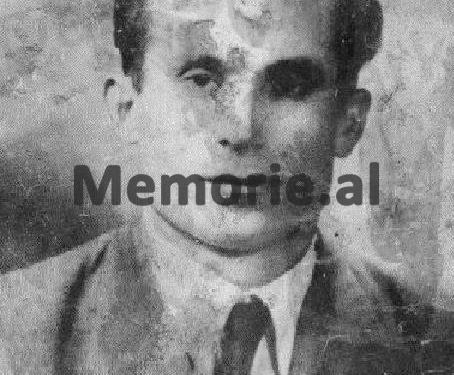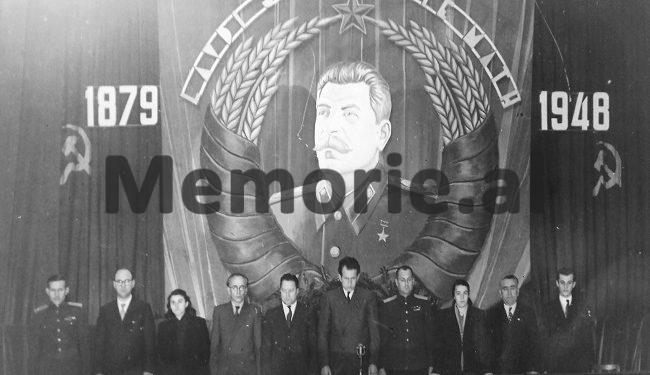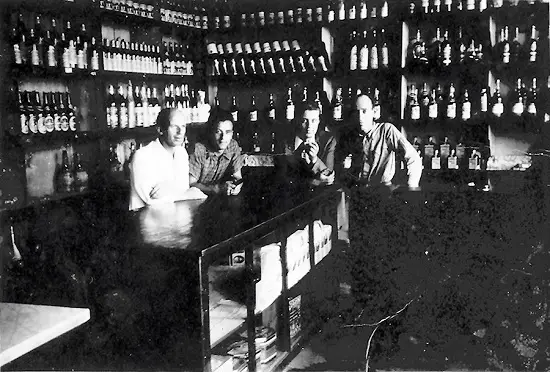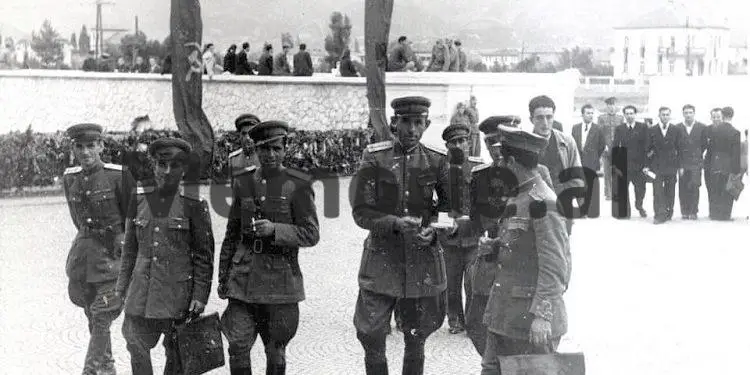By Gjergj Titani
Memorie.al / After the publication of the notes and exclusive confession of Pandi Kristos, (published in several issues) former member of the Political Bureau and one of the founders of the Communist Party of Albania at the meeting of November 8, 1941, and one of the former ministers the strongest leader of the Albanian Government from 1945-1948, from today, we are starting the publication of the memoirs of his only daughter, Assemble Vullkani (Kristo), who tells about the concern that haunts her even today about the name that Enver gave her Hoxha, the man who then ordered the imprisonment of her father in Burrel and several other camps and prisons, and the long exile in the district of Lushnja, where they stayed as a family until 1993.
In the first part of this interview, Assembly, Pandi Kristo’s only daughter, talks about her early youth full of contempt and insult from her friends and about the disgust of the leaders of the Union Committee of the Youth of Albania’s Labor the capital. The meetings with her father in prison and the deportation of her family from Tirana to Lushnja. The gloomy life of the family of the former close friend of Enver Hoxha and the hard work they did during the exile, in the Agricultural Farm of Çerma. The monstrous behavior of the powerful State Security and others. How Enver sent a letter to Nexhmije Hoxha, to continue his higher studies and the reactions after this letter, which added even more to the family’s misfortunes. Here is the first part of her shocking story.
Ms. Assembly, what do you remember from your childhood about your father who was imprisoned and exiled for so long, with whom we did a long exclusive interview published in the “Panorama” newspaper, before he left this life?
The first years of my childhood, like everyone’s, I remember dimly and very hazy. I remember playing together with my friends with dolls, jumping rope, playing symbolazi, with dumplings, etc. But, in any case, one thing is certain and has remained indelible in my memory: I don’t remember my father free, at home, but only imprisoned behind bars and that I with my mother, grandmother and often with sisters and father’s brother, we went to meet him. As a child, I was very impressed, why didn’t the father come to live at home with us, but stayed there in prison, surrounded by police and guards? My mother, aunt and uncle Koço, in order not to break my childhood joy, tried a thousand ways to somehow hide the truth from me. The three of them explained to me the fact of the father’s absence at home, with their credulous fictions, saying that the father was on duty in that place, which seemed very gloomy to me. Other times, they told me that soon, father would come home, etc., etc…!
But I was growing up. I started going to school, which was a special joy for me, because I had something to tell my father about my school achievements, but he was not coming home. When I was still a child, at school, my friends, but also the teachers, treated me well. I never felt any difference from their behavior with other children in the class or school. With me, my friends played without making any distinction or differentiation. At least that’s how it seemed to me. How did I know what they were talking about behind my back? How did I know what the youth instructors were telling them about me and my father and how they were teaching them to behave towards me?! But the day of heartbreak for my delicate soul came on one of the usual days of the 1957-1958 school years. I remember like today, the great shock I suffered, when a fellow student of my class insulted me among my friends, with the words that hit me like a barrage of icy bullets: “… we don’t want to mess with you, because you don’t you are our friend You are the daughter of the enemy of the people, who is in prison…”, and other serious expressions, which broke my soul.
Of course, I was touched at the sensibility and grieved beyond measure. How was it possible that I was isolated from my friends, in the school yard, or during breaks between classes?! That day, my life, which was taking the first steps of adolescence, seemed barren and hopeless, and I remember going home, crying bitterly. Then, when we grew up, this friend who insulted me so badly, in front of the whole class, asked me for forgiveness many, many times, but I never forgave him, because the insult he gave me cost me so much nerves and the death, the humiliation was too great and unacceptable. In these conditions, being extremely affected and indignant, although I was not used to it, I complained to the principal of the “Naim Frashëri” school, my respected teacher Dhora Karoli.
The headmistress, indignant at this gesture, more than a stray of that emotional boy, whose name I don’t want to mention, transferred him to the branch of our school, which was located nearby. But, I can never forget the warm environment that was created for us in the neighborhood where we lived, on “Halim Xhelo” street, in Tirana. There I met the family of Liri Kalesha, who was and remains my closest friend. Her father, Sali Kalesha, loved me very much, just like his daughter, and followed my progress in school and lessons with the care of a real parent. He regularly came to the meetings with the parents, which were organized at the school every week. So great was their love for us, that this is also expressed with an unparalleled act of theirs. It was Liri Kalesha, the one who came and visited me in Lushnja, when we were evicted with status and at that time, when no one stepped on our house.
Likewise, there was the Batalli family, from Vlora, with whom we lived in the same house. Father Hysen (Hysen Batalli), a wise intellectual from Vlora, who had completed his higher studies in Italy, as well as his wife, mother Ylvija, were wonderful. Even today, I don’t forget father Hysen, because I only called this man by the name father, because I called my father by his name, Pandi. When my father was sentenced, this entire family stood by my mother, Dhora. When Pandi Kristo was not sentenced to be shot, they came to us faster and with great joy, they told us that dad, sooner or later, will be released from prison one day. The daughters of this family, Vjollca and Lutfija, grown up, have treated me as a member of their family.
When Vjollca got engaged to Stavri Treska, a charming, polite colonel with a lot of civil and military culture who had completed his military studies in Italy, he always took me with him on walks around Tirana. I was extremely shocked when Vjollca died. She died at the time of the birth of the son Artan, whom I loved as my brother, especially since I have no brother. At that time, I was only 14 years old and I experienced with great pain, this second death of the Batalli family. I remember that, when I didn’t get the right to study for the university, I went to father Hyseni, who already lived in another house nearby. When he saw me so shocked and angry, he said these words to me, which I remembered for the rest of my life: “They didn’t allow you to get a higher education, but they will never be able to take away your right to It.” received self-taught culture and education. They can take away your right to get a profession and a piece of diploma, and nothing more. You will give your diploma to yourself, with the attitude you will keep in life”.
Who gave you the name Assembly and did you like this name?
When I grew up, I realized that you had an absurd name and different from other friends. I started to hate this name, since I was a child, and I still worry about it even today, despite the fact that I have already become accustomed to it. Hysen’s father’s family called me Pupe, because no member of this family wanted the name Assembly, which Enver Hoxha gave me. Father Hysen’s little son, the well-known military doctor, Selfo Batalli, when we had already returned to Tirana from exile, sent and called me. He was before his death, and after some time he died of leukemia. Both of us, with my father and my husband Robert, went to meet him at home. On this occasion, Pandi thanked and expressed his deep gratitude for their parental care towards me and our entire family. My closest friends, who never left me until the end, were Vjollca Qatipi, Tatjana Milo, Valentina Koka, my childhood friend, Jani Drita, etc.
And then, as the teenage years passed, what happened to you?
Gradually, as I grew older, I understood more and more the great political and family tragedy that had befallen us. I was already convinced that this tragedy, not only ours as a family, would continue for a very long time. At least, until the natural death of Enver Hoxha, if not more. In our family, the usual visitors initially became rarer and rarer, so true is this, that we, in our family, became accustomed to this situation. Even when someone often came to visit us, it seemed to us that something unusual was happening and suspicions immediately began. This was a strange state, self-censorship, and the man lived in two. He lived one life for himself and his loved ones and relatives and another life, a completely false life, he lived for the eyes and faces of others, of opinion, of the instinct to protect himself, from any evil and unexpected that could come to him, in any case and from anyone.
In 1961, when I reached the age of 15-16, which was the age threshold to be admitted to Rini (BRPSH), I also fulfilled the prayer, just like all my school friends. The school’s Youth Committee had approved our admission in principle, as had the class’s youth organization, which practically carried out the admission. But the most difficult threshold was crossing the biggest obstacle, the Tirana District Youth Committee. Initially, we prepared and presented ourselves to the school’s Youth Committee, and from there to the Tirana District Youth Committee. The interview ceremony in front of the secretary of the District Youth Committee, which surprisingly also certified the admission of young men or women to the BRPSH, seemed simple, but it was a social screening, it was a true insidious investigator and young men or women. Precisely, in these social cores, as I understand today, the poisonous thorns and thistles of the vicious class war took root.
Otherwise, there is no way to explain the monstrous statement of the “first lady of the country, Nexhmie Hoxha”, on a solemn occasion in the city of Vlora: “…We, the children of class enemies, whoever they are, will we punish them politically and legally, for generations, so that they will never be able to raise their heads…”! The secretary of the school’s Youth Committee, Robert Floqi, was obliged to make our presentation before the District Youth Committee. I remember, as if a cold snake sensation ran down my spine, when the secretary of this S.T. Committee, whose name I do not want to mention out of respect for his wonderful and very well-educated children, grandchildren and great-grandchildren, (e not “…to fight the children for seven generations so that they never raise their heads…”), because it would please Nexhmije Hoxha, whom that “friend” served faithfully, and she would remember that her poisoned orders, said in Vlora, or somewhere else in Albania, many years ago, had laid down deep roots, that they cannot be uprooted even to this day.
When he saw that he had a fragile victim in front of him, whom he could destroy, by not allowing him to enter the youth organization, he asked me textually with these words: “You girl, are you in prison to meet your father”? “Yes”, I said. “What about the mother, did she separate the father, since he was convicted as an enemy of the party, the people and Albania”? “No, I told him, why should he share it”?! “You, he told me, – you cannot enter the BRPSH, because you are not ideologically and politically unprepared, to develop the class war, as long as it does not influence your mother, to separate from your father and not go to prison meet him, because he is a ferocious enemy of the people of the party”. What more can I say?! I began to think angrily and seriously, to what level the politics of Enverist rule had developed the class war. “Very important friend”, S.T., that is the secretary of the Committee of the BRPSH of the Tirana District, pointed out to the desolate Robert Floqi, why he had also presented me, the daughter of the enemy of the people, Pandi Kristo, before him in the Committee and had not been vigilant enough to prevent this class deviation!
And when you went to the “Qemal Stafa” gymnasium, how did you feel, did you think about continuing your higher studies?
In 1963. Then with the director of the high school “Qemal Stafa” Gaqo Marko, originally from Korça, who taught Language-Literature and History of the ALP, I had a rather fierce clash.
What was this conflict with the high school principal?
I clearly remember that once, according to the program of the history of the APS, we had the topic on “The First Congress of the APS”. Apparently, I was raised by the director to show how the party in this Congress harshly and rightly condemned its enemies Koçi Xoxe, Pandi Kristo, etc. I, who was already an adult girl and family troubles had matured me prematurely, refused to answer in front of the class. On this occasion, the tutor of the class, mathematics professor Petrit Çami, spoke to me separately, about this occasion and said: “… yes, answer, my daughter, enough to get the grade, etc.”, but I never agreed to I compromised, with my professors, to sell my father, who had taken away and was taking away so much. I adored my father and in my consciousness, I never accepted that he was an enemy of the people. A partisan father, a brave warrior, as my grandmother and mother described to me, could never be an enemy of the people.
While my father was in Burrell prison, I could no longer dream of getting a grade or the right to study at university. I was never given this right, just like my classmate, Shpresa Pogoni, because she was also from the class of the politically persecuted. Extremely angry, I was almost put in prison, thanks to my persistence, which Enver Hoxha did not like. Here’s how the case happened. When I was in Tirana, I sent a telegram to Enver Hoxha and asked for a meeting with Nexhmije Hoxha, for the right to study. After that, one of his secretary called me and informed me that: “…comrade Enver, he received the telegram that you sent him, and together with his friend Nexhmije, they discussed this matter, so that you will not be given the right to study”. In these circumstances, after a month, the father was released from prison and with a special order of the Deportation and Internment Commission; the three of us were expelled from Tirana and flown to the city of Lushnja. This is where my dream of high school ended.
What can you tell me about the time you lived in Lushnja as an exile?
Upon arriving in Lushnja, we were assigned to live in the barangays that were built just after the earthquake that occurred in 1960-1961, until the palace they were building just for us persecuted people was finished. We moved into this apartment after six months. We got this house with the help of the head of the Department of Internal Affairs of the Lushnja District, Nuçi Tira, an old communist originally from Pogradec and my father’s former friend, as well as the chairman of the Executive Committee of the Lushnja District, Uran Hila. This was a correct and honest man and his daughter, I had many friends. Although, a certain softening of life in the external appearance had begun, but our unbearable troubles, we would begin a little later. At this time, my mother worked as a seamstress. The father worked as a shoemaker, a profession which he had already practiced in Korça, before the partisan war began.
After Nuçi Tira, head of the Branch in Lushnjë, there was Ropi Çifligu, who immediately removed my father from the Special Shoemaking Workshop and took him to ordinary production, while I was never given a job. The head of staff of the Executive Committee, whose name I do not remember, one day, when I had gone to her to look for a job, said to me: “You don’t know whose daughter you are, my daughter?! Love and work”! Then, extremely indignant, due to the fact that they were not giving me a job, that is, they were not giving me a chance to live, I, very indignant, turned to Enver Hoxha again, without asking my father, because I wrote the letter when I was in Tirana. I remember that my father scolded me for writing a letter of complaint to Enver Hoxha and Mehmet Shehu. From what I learned a little later, Mehmet Shehu had read the letter and with it in hand, he had gone to Enveri. My letter was very detailed and severely accused what the state was doing to us.
Vangjeli Sotiriadhi, Enver Hoxha’s old secretary, called her father’s sister, who was working at the time at the only optical shop in the center of Tirana, and told her these words: “…listen, Enver, when read the Assembly’s letter, he was very angry and had said textually that; if she wasn’t a girl, I would put her in prison, so she’s a widow worker in production, in the shovel…”! So she, aunt, instructed us that I should never write letters to the leadership. As a counter-reaction, I never went to work again and I never wrote a letter to Enver Hoxha again or someone else from the leadership, because I had been warned, that I could go to prison for nothing…!
Resume
Who is Assembly Kristo (Vulkani)?
Assembly Pandi Kristo was born on October 20, 1945, in Tirana. He completed primary and seven-year school in 1959, at the “Naim Frashëri” school and the “Qemal Stafa” high school, in 1963. On November 5, 1963, until 1983, by order of the Central Deportation and Internment Commission, he was expelled from his family in the city of Lushnja. He did not find work, although he had asked several times at the Executive Committee, at the labor office. In 1983 until 1989, they were interned by the decision of this Commission, in the Çerma Agricultural Farm. She works as a side worker in the field brigades. On May 11, 1989, he was released from exile. On December 23, 1989, she celebrated her marriage with Robert Sotir Vullkanin, ex-convict and new political convict, for 26 consecutive years. Takes a series of trips abroad, together with her husband and mother-in-law. On May 15, 1991, he goes to the city of Novi Sad, Yugoslavia. In 1995, until he retired in 2001, he worked at the Civil Status office in Local Unit no. 6, in Kombinat District. On July 10 of the same year, he settled in Romania. She is an activist of many associations for the Protection of Human Rights and Freedoms, children and women. Memorie.al
The next issue follows














